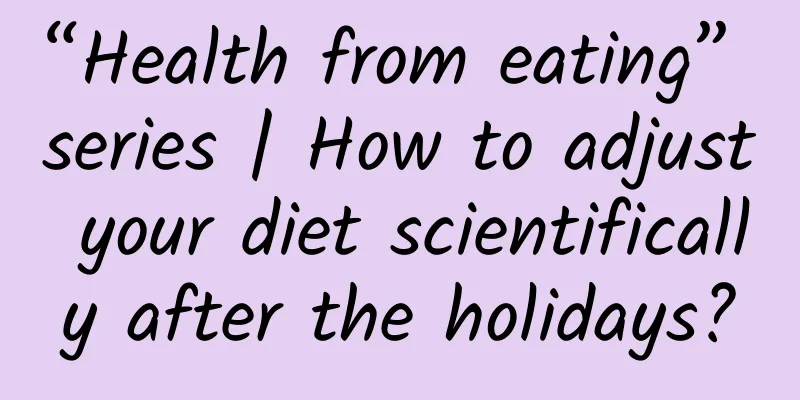Is it more hygienic to fold the quilt immediately after getting up? 10 seemingly healthy but actually unhealthy lifestyles, how many of them do you have?

|
Is it more hygienic to fold the quilt immediately after getting up? Is it healthier to drink soup and eat while it is hot? Is it hygienic and clean to rinse raw meat under the tap? Is it safe and hygienic to wrap food or wipe tableware and fruit with paper towels? … In daily life, there are some behaviors and habits that seem healthy but are actually harmful to the body. These habits are very common and many people can identify with them. September of each year is the National Healthy Lifestyle Promotion Month, and September 1, 2024 is the 18th "National Healthy Lifestyle Day" . Today, let's take stock of those lifestyle habits that seem healthy but are actually harmful to the body. Myth 1 Rumor content: Is it more hygienic to fold the quilt immediately after getting up? The truth: Not really. The correct approach is: after getting up, do not fold the quilt immediately, but keep the room ventilated to ensure that the quilt and sheets are in contact with air and sunlight. At the same time, pay attention to changing sheets, quilt covers and pillowcases frequently. Analysis: After using sheets and quilt covers for a period of time, it is inevitable that there will be some bacteria on them. This is mainly because people lose some body fluids every night during sleep, including sweat, saliva, and reproductive fluids. For people who are used to sleeping naked, there may be a small amount of feces and urine on the bedding. In addition, some people will subconsciously fall on the bed to rest after coming back from outside, and a large number of microorganisms will also be stationed on the bedding. When sleeping at night, the body temperature and exhaled water vapor of the person will naturally form a warm and humid culture dish in the quilt. If you fold the quilt immediately after waking up, the temperature and moisture will be retained in the quilt, which is difficult to evaporate. Therefore, the practice of folding the quilt immediately after getting up is actually helping the growth of bacteria and fungi. Copyrighted stock images, no reproduction is authorized Myth 2 Rumor content: Is it healthier to drink soup or eat while it’s hot? Fact: This statement is inaccurate. Drinking or eating over-scalding water and food will cause harm to the body. The relatively suitable temperature is between 35℃ and 40℃. Analysis: Many people like to "eat food while it's hot" and "drink water while it's hot". The "hot" in this context actually means "hot" for our body. Its temperature is often far higher than the suitable temperature of 35℃, and can even reach above 65℃. Many people like to eat hot food because they think it tastes good and is hygienic. At the same time, the slight pain caused by hot food will also make the brain secrete "endorphins" that make people feel happy to relieve pain. But eating hot food for a long time is not good for the body itself. The oral mucosa, esophageal mucosa and gastric mucosa of the human body are very fragile and it is difficult to withstand food above 65℃. Occasional damage can be repaired by itself, but if you eat hot food for a long time and stimulate the mucosa again and again, they will lose the ability to heal themselves, and then cause chronic pharyngitis, reflux esophagitis, esophageal ulcers, gastric erosions and even esophageal cancer. Therefore, in order to avoid causing harm to your body, it is best to let it cool down a little before eating. Myth 3 Rumor: Is it hygienic and clean to rinse raw meat under the tap? Truth: Not accurate. Raw meat will inevitably be infected with some bacteria during transportation. Washing with running water will cause bacteria to splash all over the kitchen, expanding the contamination. Analysis: From slaughtering, packaging to selling, raw meat often takes a few hours to a few days. Most raw meat storage spaces are difficult to meet the standard of complete "sterility". Therefore, by the time you buy it home, the meat may already have various corrupt bacteria and pathogenic bacteria such as Escherichia coli, Staphylococcus aureus, Acetobacter, Pseudomonas, etc. Wash the raw meat directly under the faucet. The running water falling from a high place has a certain impact force, which will splash the bacteria attached to the meat to all corners around. The correct way is to fill water in a fixed container in advance, then put the raw meat in it to wash, and then carefully wash the container, sink and your hands after washing. In addition, it should be noted that it is best to use a separate cutting board and props to cut raw meat. When storing raw meat, it is also recommended to use a separate package to prevent it from infecting other foods in the refrigerator. Myth 4 Rumor: Is it safe and hygienic to use paper towels to wrap food or wipe tableware or fruit? The truth: Not necessarily. Paper towels of different brands and uses have their own manufacturing standards, and many paper towels may not be able to directly contact food. Analysis: Due to different uses, the common paper towels in our lives also have different manufacturing and disinfection requirements. They are mainly divided into two categories: toilet paper and paper towel paper. The implementation standard for toilet paper is GB/T 20810, and the implementation standard for paper towel paper is GB/T 20808. Although the numbers are similar, the standards vary greatly. First, in terms of bacterial content. Paper towel paper requires a bacterial content of <200cfu/g and a fungal content of <100cfu/g. For toilet paper, the bacterial content is required to be <600 cfu/g, and the total number of fungal colonies is not specified. Secondly, paper towel paper cannot contain migrating fluorescent whitening agents, but toilet paper has no clear requirements on this point. Therefore, it is not recommended to use toilet paper for direct contact with food. Although kitchen paper can be used for kitchen cleaning, not all kitchen paper can come into contact with food. It depends on whether it complies with both GB/T 26174-2010 and GB 4806.8-2016 standards. If you really want to use disposable paper products to wrap food, it is recommended to choose baking paper that has passed quality inspection. Myth 5 Rumor: After washing dishes, you should dry them immediately with a towel. Is this safer and more hygienic? Truth: Not true. Repeatedly used towels are not necessarily clean and may cause bowls, plates and other kitchen utensils to become contaminated again after being washed. Analysis: Most of the towels in the kitchen are reused. In this process, seemingly clean towels will gradually become a gathering place for bacteria. The "White Paper on the Survey of Chinese Family Kitchen Hygiene" released by the Chinese Preventive Medicine Association pointed out that after a week of use, the number of bacteria on a brand new rag will be as high as 2.2 billion. It is difficult for most families to change it once a week, and it is often used to be damaged, and the number of bacteria is terrible. Using it to wipe the freshly washed dishes will undoubtedly transfer bacteria to it. Moreover, it is difficult for a towel that is soaked during the wiping process to completely remove the moisture on the dishes in the next wiping, but it will leave a trail of watermarks. Many people are used to stacking the dishes and putting them in the cabinet after wiping, which will also accelerate the reproduction of microorganisms. The correct way is: you can be lazy appropriately. Make sure to rinse it clean and put it in the drain basket to drain it naturally. Wait until there is no moisture at all before putting it in the cabinet. Copyrighted stock images, no reproduction is authorized Myth 6 Rumor content: Washing your private parts with lotion every day will make you healthier? Fact: This is not correct. Gynecological washes on the market are often of various types and of varying quality. Improper use can have negative effects, and the female private parts themselves have the ability to clean themselves, so there is no need to use washes every day to clean them. Analysis: There are four types of gynecological washes: the "Xiao" number, the "Zhuang" number, the "Xie" number, and the "Guoyaozhun" number. Their respective uses are also different. For example, the "Zhuang" number can cover up bad odors, but it has no therapeutic effect. The "Xie" number belongs to Class II medical devices, which are suitable for local infections and other symptoms of patients with vaginitis, vulvitis and cervicitis. The "Guoyaozhun" number also has a clear treatment range and effect, and it is best to use it under the advice of a doctor. The "Xiao" number has the effect of disinfection and sterilization, but it can only be used for a short time. Long-term use will destroy the self-cleaning environment of the female vulva. In fact, there are many kinds of microorganisms living in the female vagina, and they maintain a relatively stable state under the action of lactobacilli to resist the invasion of foreign bacteria. Especially for women who are menstruating, pregnant, lactating, or have bleeding or damage in the affected area, they should be more cautious in choosing washes. If you find that you are feeling unwell, it is best to consult a doctor first and ask the doctor. Do not take medicine on your own to avoid covering up the real cause of the disease. As for cleaning the private parts, if there is no obvious abnormality, you only need to clean it with warm water when taking a shower every day. Myth 7 Rumor content: Is it hygienic and clean to pick your teeth with a toothpick immediately after a meal? Truth: This is not recommended. Toothpicks can only remove visible debris on the surface of teeth, but cannot thoroughly clean teeth. Sharp toothpicks may damage gums and cause other health risks. Analysis: The tip of a toothpick is usually very sharp, and the tail is wider. When picking teeth, it is difficult to see the environment in the mouth, and the gums may be injured if you are not careful. If the gums are damaged and recede, the gaps between teeth may become larger and more prone to getting stuck. In addition, no matter how thin the toothpick is, the space it can drill is limited, so it can only remove debris that is obviously blocking the teeth, and cannot completely clean the debris and bacteria in the gaps between teeth. If you want to thoroughly clean your teeth and mouth without damaging your teeth, it is recommended to use dental floss and a water flosser. Myth 8 Rumor content: The toilet smells bad, is it more hygienic to flush it in the middle? Truth: This is not recommended. Every time you flush the toilet in the middle of going to the toilet, you are actually bringing your buttocks into close contact with all kinds of bacteria. Analysis: Many people can't stand the unpleasant smell when going to the toilet, so they choose to flush in the middle of going to the toilet. In this way, the smell is less, but the bacteria are spread out evenly. This is because when flushing, the air in the toilet will quickly be filled with tiny droplets called "aerosol plumes", which will float upwards and continue to wander in the air without being seen by the naked eye. Studies have shown that the concentration of bacteria detected in the toilet is 10 times higher after flushing with the toilet lid open than when flushing with the toilet lid closed. In other words, if you flush in the middle of going to the toilet, your buttocks and legs will act as the toilet lid, and those bacteria will splash directly on your skin. If the smell of feces is too foul, it may be a reminder that there is something wrong with your gastrointestinal tract. After long-term observation, if you find that the color and properties of the feces have also changed, it is best to go to the hospital for a formal examination to troubleshoot the problem. Author: Li Mi, popular science creator Review丨Zhang Yu, researcher/PhD, Chinese Center for Disease Control and Prevention, national health science expert Tang Qin Director of the Science Popularization Department of the Chinese Medical Association National Health Science Popularization Expert |
>>: I seem to have been diagnosed with "back-to-school anxiety disorder". Can I take sick leave?
Recommend
WeChat operation: Master all the skills of WeChat push in 10 minutes!
1. Article Overview Core content: WeChat push ope...
Who sets the shelf life of food? Can you still eat food one day past the expiration date?
Everyone knows what the expiration date of food i...
Pay attention when doing ASO: be careful that your competitors may copy your business by using pinyin keywords.
Many friends on the Internet have talked about th...
How much does it cost to develop a small program for geotechnical building materials in Xing'an League?
The development of the Xing'an League geotech...
Neither the excellence of a single product nor Xiaomi’s experience can save Vancl
At the Vancl press conference on the 28th, Chen N...
The twelfth episode of the Aiti tribe clinic: How to distribute tens of millions of web requests
【51CTO.com original article】 Activity description...
A review of the 2015 BAT campus recruitments: some increases and some decreases
It is the beginning of another school year, and i...
"Little Me" is a hit! About the cerebral palsy in the play: I'm not stupid, just a little slow
Recently, the movie "Little Me" is bein...
Objects can also have a sense of touch, taste and smell! How will sensor technology evolve?
Recently, the internationally renowned academic j...
How are the App Store rankings determined? How to get on the top of the rankings
In the past two years, Xu Huaizhe and Liu Xiong h...
Introduction to Baidu search promotion precise matching method!
What is an exact match? Use exact matching. Your ...
Watching videos on your phone, getting more and more addicted - is being addicted to social media a disease?
In addition to meeting strict disease diagnostic ...
How to effectively activate new users? These 3 things you need to know
We all know that attracting new customers is impo...
The competition among the top three luxury car companies is gradually narrowing
In the first quarter of 2017, Mercedes-Benz jumpe...
Can soil carbon storage combat climate change? The answer is more complicated than you think
Plants convert carbon dioxide into roots, stems, ...









